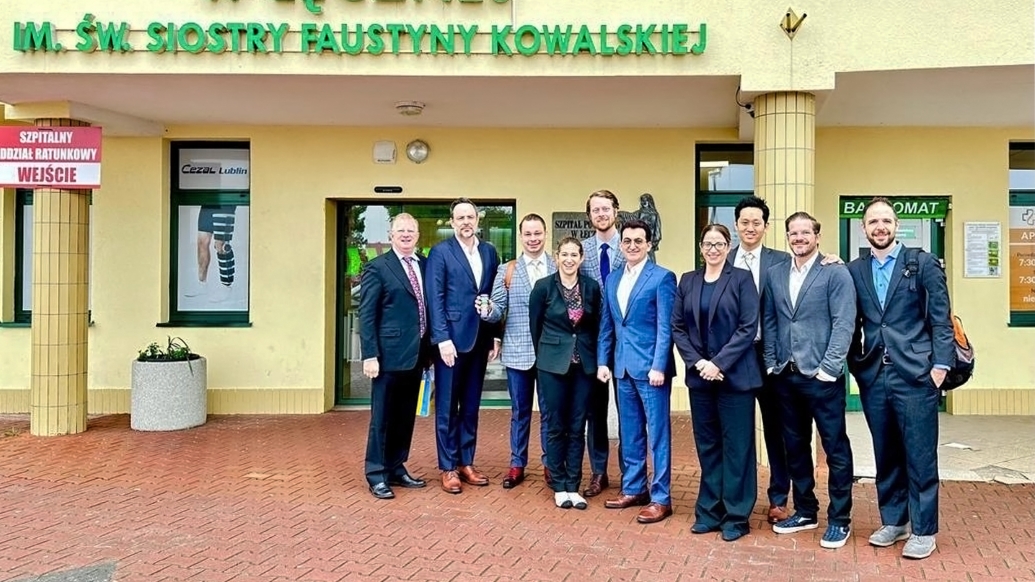Many need medical attention after experiencing burns from unsafe living conditions during the ongoing conflict with Russia
5:00 AM
Author |

Each year, David Brown, M.D., a plastic surgeon at the University of Michigan Health, travels to Ukraine for one week to help Ukrainian doctors operate on pediatric burn victims across the country.
But with the ongoing conflict in Ukraine, this year’s trip looked a little different yet was equally successful.
Helping burn victims in Ukraine
Ukraine has a high number of burn victims across the country. Most patients come from areas that don’t have a safe way to heat their homes, have unsafe cooking situations, unsafe water heaters setup, or other unsafe living conditions which result in serious burns.
Their living conditions have been made worse by the conflict, with the demand for procedures increasing. But this is where Brown and his team come in.
Each year, Brown selects two plastic surgery residents from the University of Michigan to accompany him on a trip to Ukraine to assist Ukrainian surgeons in burn procedures.
Due to the ongoing conflict in Ukraine though, this year’s trip instead headed to to the Independent Public Health Care Facility in Lecnza, Poland.
“Despite not being able to enter Ukraine, I felt that it is important to continue with the trip and make every effort to help where we could,” said Brown. “We were able to successfully operate on some difficult pediatric cases and set these children up to continue to grow into healthy adults.”
Treatment across the border
Typically, the group performs around 50 procedures over the course of a week. But this year, 21 pediatric patients were in need of extensive, complex surgeries. The nonprofit group who funded the trip, Doctors Collaborating to Help Children, paid for the patients’ travel expenses to cross the border and receive their treatment.
“Normally we are going to the children in their own country. Being in Poland changed how much this trip would cost so we had to be selective,” said Brown. “Some of the children we saw traveled over 30 hours to come receive treatment.”
Artem Posunko, M.D., a plastic surgeon from the Regional Medical Center of Family Health in Dnipro, Ukraine, helped Brown and his team identify children across Ukraine that would benefit from the team’s work and needed to be operated on soon due to burns inhibiting their quality of life.
The burns endured by some of these patients were all in locations that were inhibiting their bodies to grow, – such as the backs of their legs or on their hands. Without proper removal of the scar tissue, their skin would not be able to rejuvenate, resulting in difficulty walking or completing daily tasks as they grew older.
“The surgeons in Ukraine are more than capable of performing these procedures, the issue lies in a lack of ability to get proper supplies,” said Brown. “We rely on their team to guide us to the severest cases, and they rely on our team to bring supplies that they may have limited access to that are needed to perform these procedures. We aim to work with the Ukrainian surgeons, not for them.”
In tandem with Polish surgeons, Brown and plastic surgery residents from U-M, Gina Sacks and Alfred Yoon, worked alongside a team of 10 who traveled from Shriners Children’s Boston, Harvard University, Washington University and places in Texas to assist in reconstructing the skin of these patients.
Yoon recalled the positive attitude of one patient after a particularly difficult procedure.
“I was amazed at the resilience and strength of the children of Ukraine. Even the day after a complex hand reconstruction, the children were moving around and smiling as if nothing happened,” said Yoon. “It was evident that because of the war and resulting adversities, their personalities have hardened, and they did not consider recovering from surgery to be difficult at all.”
The team noticed many similar reactions from patients and their families as well. Despite the complexity of the procedures, or the pain of the recovery, they expressed gratitude towards the team for providing such care.
Leaving an impact
Brown describes his experience as a double-edged sword.
“The high case load combined with the jet lag can be physically exhausting, but the experience is true and raw,” he said. “Sometimes you lose sight of how much of a difference this work can make when you are consistently performing operations here in the United States. Seeing the difference these procedures make not only in the lives of the patients but also their families remind you how meaningful this work is.”
Yoon shared a similar sentiment.
“Experiences like this brings me back to why I first embarked on this journey to become a surgeon, for the patient.”
Brown hopes to continue participating in these trips with other Michigan Medicine residents for years to come.
“I’m grateful to the Doctors Collaborating to Help Children foundation for making these trips possible,” said Brown. “Seeing the impact our work has on these children is a truly heartwarming and grounding experience.”

Explore a variety of health care news & stories by visiting the Health Lab home page for more articles.

Department of Communication at Michigan Medicine
Want top health & research news weekly? Sign up for Health Lab’s newsletters today!





